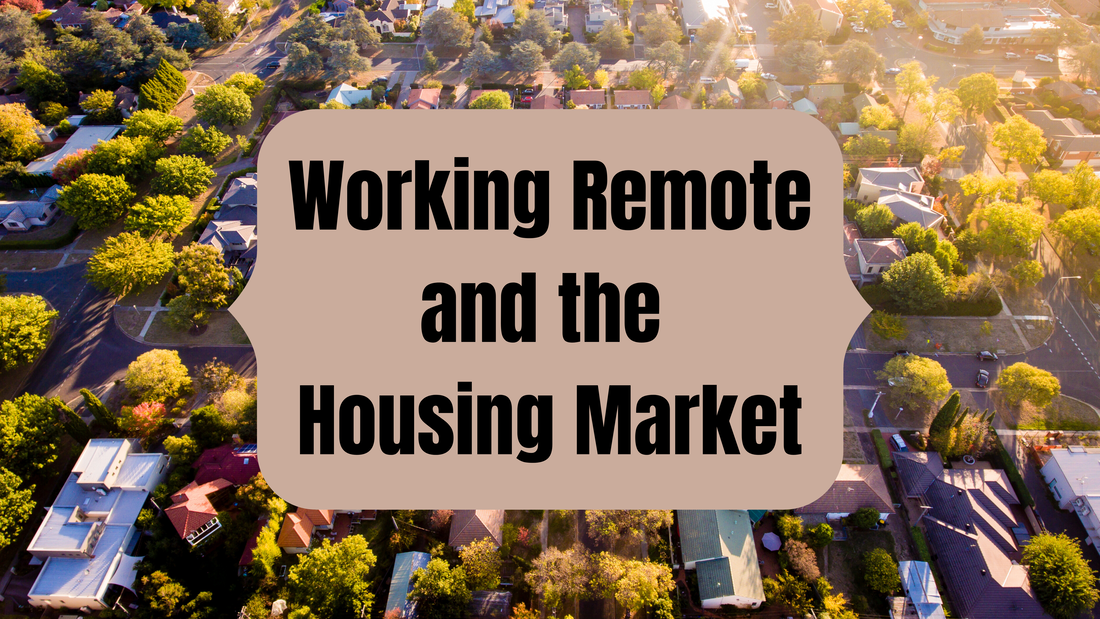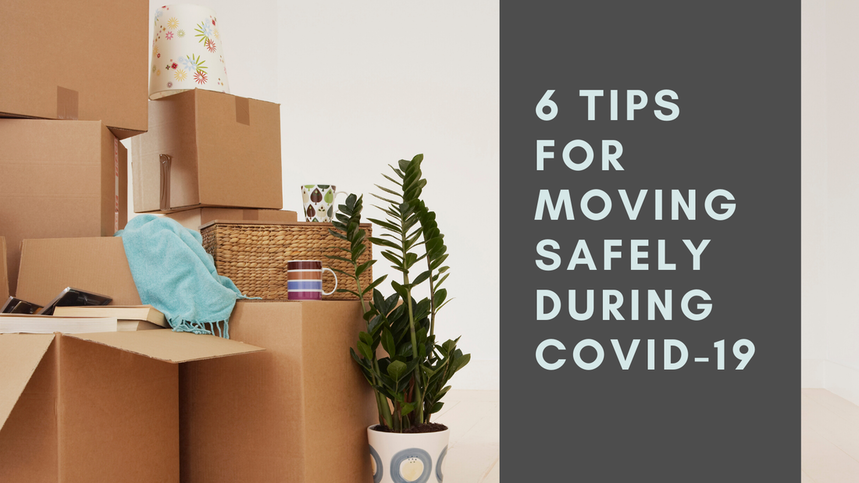|
COVID-19 has changed just about every aspect of our lives, from the way we interact with others to our work environment. In the past four months, several companies have instituted work from home policies and have found that employees are not only still able to get their work done, but many of them enjoy working remotely. Working remote means that employees cut out their commute time, giving them more time to spend with their family. It also cuts down expenses for the company in utilities and rent on the office space they lease. Many companies are now considering keeping some of their workforce remote, even as restrictions ease. Aside from lowering their costs, they are also able to hire from a much broader pool of candidates by allowing employees to work virtually anywhere. So, if you don’t have to live close to where you work, what does this mean for the housing market? In general, potential homebuyers are house hunting in the suburbs and more rural areas. Many of the attractive aspects of city life have been put on hold during the pandemic in the name of social distancing. Meanwhile, urbanites may feel cooped up in small apartments, apprehensive about sharing amenities and common spaces (elevators, laundry rooms, on-site gyms) with their neighbors. A survey of 1,004 people by the International Council of Shopping Centers found that twenty-seven percent of adults in the U.S. are considering moving because of COVID-19, and many of them are looking to the suburbs or rural towns. Realtor.com surveyed 1,300 people over the first two weeks of April and found that 15.7% of homebuyers want more space in their next house and 13.6% want “more and better outdoor space.” For many people, being able to work remotely means they can afford their dream home by moving away from the city, where the cost of living is often quite high. In fact, Vic Lederman of Stansberry Research makes the case that remote workers in the tech industry (like Facebook or Twitter) will make well above the U.S. median household income level and so if they settle in these more rural towns, the entire area will experience a rising-tide effect. That said, working from home isn’t everyone’s ideal situation. Some employees are anxious to get back to the office, away from the distractions of home. While these employees may want to stay within driving distance of the office, we could see more offices move to the suburbs as they seek more affordable buildings with sprawling floors that are conducive for social distancing. Whether or not this trend will be short-lived or the new way of doing business, the need for social distancing has certainly created a desire for more space on both a personal and commercial level. Sources:
https://www.forbes.com/sites/jennifercastenson/2020/06/08/value-of-home-life-is-back-and-has-land-buyers-moving-way-out/#69bd86b271f1 https://www.cnbc.com/2020/06/18/coronavirus-update-people-flee-cities-to-live-in-suburbs.html https://www.realtor.com/research/top-consumer-home-features-coronavirus/ https://www.cnbc.com/2020/05/31/after-flocking-downtown-to-woo-millennials-offices-might-move-back-to-the-burbs.html https://stansberryresearch.com/articles/capitalisms-next-rising-tide-is-here More Reading: https://www.realtor.com/news/trends/frantic-new-yorkers-snatch-up-unwanted-homes-in-the-suburbs/ https://www.pymnts.com/news/retail/2020/pandemic-might-launch-flight-to-suburbs/ https://www.usatoday.com/story/money/2020/05/01/coronavirus-americans-flee-cities-suburbs/3045025001/
0 Comments
Although the Covid-19 pandemic has forced most of us to shelter-in-place, some of us may find it necessary to move to a new shelter. A move could be something that’s been in the works for months, or something that’s come up unexpectedly. If you find yourself in either scenario, don’t worry. There is plenty of good advice available to make your move more doable, even under trying circumstances.
First, if you are at a high risk of illness due of Covid-19, consider postponing your move. According to Coronavirus.gov, those who are over 65, those who have pre-existing medical conditions, and those who live in nursing homes or long-term care facilities are at greater risk of developing severe illness if they contract the coronavirus. If you find it necessary to move now, whether you are in the high-risk population or not, be sure to read the following tips to make your move as safe and low-stress as possible. Moving services have been deemed essential by the federal government, so moving professionals are still operating in all states. This includes movers, storage facilities, and rental truck companies. The following tips are applicable whether you choose to employ professional services for your move, or take a D.I.Y. approach. 1. Research Before You MoveDetermine If You Are Allowed to Move
Moving is considered “essential” by the federal government, however, some localities may have temporarily restricted moving because of Covid-19. For example, some buildings in NYC do not permit moving because of the shelter-in-place order. Check with your local and state government before you plan to move to make sure there are no restrictions in your case. If you are part of an HOA or condo board, also check with them to see if there are any temporary restrictions on moving.
Research Moving Services
Conduct research into all the different services you are planning to use during your move.
If you want to hire a moving company, interview them about their sanitary practices, how they clean and disinfect their equipment, and how they determine that their workers are in good health. Find out what kind of protective gear the company uses, like masks, gloves, and booties. Check to see if they have a cancellation policy in case you need to change plans last minute. Usually, contracts with moving companies are non-binding, so you have a window of time in which you can cancel the move without having to pay for it. If you are going to use a storage facility, call ahead to see what their current hours and policies are due to Covid-19. Storage facilities may have made changes to their operation such as limited hours of access or a limit to the number of customers allowed in the storage facility at one time. You will also want to make sure the company you use is sanitizing their storage units and common areas properly. Similarly, if you are going to rent a truck or trailer, find out about current company policies on operations and sanitation. 2. Plan the Timing of Your MoveStrategically Space Packing and Unpacking
Now more than ever it’s important to make a detailed plan of the timing of your move, to avoid any possible contamination of your belongings. First, because Covid-19 can last up to 24 hours on cardboard boxes and other surfaces, it’s best to pack everything up, and then wait 24 hours before you begin the moving process. Even if everyone wears gloves and masks, it’s better to take this extra precaution to protect your moving team.Then, you should wait 72 hours from the time your belongings are moved to your new home until the time you actually start living in the space. This way you can ensure that there is much less of a chance that a virus will survive on any of the surfaces.
If you are not able to postpone occupying your new home, be strategic in the way you unpack. Pack one box that you will open first, containing all your cleaning supplies and any essential items for the first few days, then keep it separate from the other boxes and let them sit for 72 hours. Take the time to clean and disinfect your new home before unpacking everything. Then, as you unpack, disinfect furniture, boxes, and anything else that was touched by your moving team before using it. Plan Well in Advance for Setting Up Services
At this time, it’s likely to be harder to schedule an appointment with a technician to set up cable or internet services. It’s best to start looking for a technician well in advance so you can get an appointment at the time you need one.
3. Keep Open Communication With Others
Maintaining open communication with everyone who will be affected by your move is key to a smooth moving process. Tell your neighbors about your move and include specific details about the date and time of your move so they can maintain social distancing during your move. Ask neighbors if the timing of your move will be ok or if it could be problematic for them.
If you are working with a moving company, confirm your reservation and talk about how you will use safety precautions during the move. If you need to cancel the move, contact your moving company or anyone else who will be affected, immediately. If you rent, communicate with your landlord about how to return your keys and pick up your security deposit with proper social distancing. Also talk to your new landlord about how you can move in safely. 4.Take Sensible Safety PrecautionsReduce Personal Contact
Do as much planning as possible by phone or email, this includes scheduling the move and getting quotes from any professional services for the move. Many larger moving companies are already equipped to perform contactless moving. They can do virtual surveys using video chat technology instead of in-home surveys to give an accurate quote for the move. Video chat technology is also used by the crew during the move, allowing the customer to be away from the home while the move is taking place. For example, Bellhops, a national moving company, uses Facetime to communicate with customers remotely while they perform their moving services.
If you have friends or family helping you move, keep your moving crew as small as possible. If you need a lot of help, consider having helpers come in staggered shifts. Assign one person to manage the moving process and make sure all safety measures are followed and safe social distance is maintained. Don’t shake hands with any one or hug to show appreciation to those helping you move. An alternative is to give a tip to show appreciation, there are now many virtual ways to pay for services, like Venmo or Paypal. For friends and family, consider gift cards instead of hosting a meal or party. Be Prepared For Cleaning and Sanitizing
Before the move, stock up on items you’ll need for cleaning and sanitation purposes. Make a list of everything you need and try to get it in one trip to the store. Be sure to have masks, gloves, and booties for everyone helping with the move. If you are working with professional movers, find out if these are supplied by the company, or if you will need to supply them. Also purchase enough hand sanitizer, antibacterial soap, disinfectant spray or wipe, and paper towels for everyone helping to use.
Use Clean Boxes
It is safer to do your own packing in order to minimize contact with others. Since Covid-19 can live on cardboard surfaces for up to 24 hours, you should get new boxes or use boxes you already have at home. Do not collect used cardboard boxes from elsewhere. Cardboard boxes are preferable to plastic bins because the coronavirus can live for up to 3 days on plastic surfaces.
Clean and Sanitize as You Go
Before your move, sanitize items as you pack them. You can use a commercial sanitizing product, or make your own by mixing one tablespoon of bleach to one gallon of water.
During your move, make sure there are soap and paper towels by sinks and hand sanitizers by the door. Before and after the move out, use disinfectant on any surface or object that is touched often, such as door knobs and handles. Clean and disinfect the common areas in your home. You will also want to do the same in your new home after the movers leave. In an apartment or condo building, be sure to disinfect commonly touched surfaces, such as elevator buttons. 5. Consider Making Donations
Rather than moving all the non-perishable food you’ve accumulated, consider donating it during this time of increased need for many people. Even before the pandemic began, about 40 million Americans struggled to pay for groceries. Covid-19 has caused closures of schools and soup kitchens as well as massive layoffs, meaning that more people than ever are in need of food.
You can donate to a local food bank or to Move for Hunger, an organization that makes it easy to donate extra food when moving. Also consider donating household items. Call around to different charities in your area to see if they are accepting donations at this time. Some charities are still in operation and open to receiving donations. 6. Postpone Your Move if Anyone Gets Sick
If anyone in your household comes down with an illness or shows symptoms related to Covid-19, it’s best to postpone the move until a health professional gives you the green light.
Make sure to communicate with your moving company about their cancellation policy. Under the circumstances, it’s reasonable to expect most companies to be flexible and not charge anything for cancellation due to illness. Web Resources
As you plan your move, it’s a good idea to check out online resources that will keep you updated on health and safety guidelines. The following resources may be helpful:
Sources
https://www.moving.org/guidance-for-consumers-moving-during-the-coronavirus-outbreak/ https://www.realtor.com/advice/move/how-to-move-safely-during-coronavirus/ https://www.zillow.com/blog/5-tips-for-moving-during-covid-19-231657/ https://www.moving.com/tips/moving-during-coronavirus-epidemic-heres-what-you-need-to-know/ https://www.forbes.com/sites/taramastroeni/2020/04/15/how-to-move-during-coronavirus-5-tips-for-moving-safely-during-the-pandemic/#3e9edb9a3393
In my last post on buying and selling a home at the same time, we looked at some scenarios in which it’s best to sell your existing home first and then buy your new home. But there are also scenarios in which it’s advantageous to buy first and then sell.
Buying First
Let’s look at two examples of scenarios in which it can be better to buy first, and some steps to take to help you plan it all out.
Available Funding
If you have the funds available to buy a new home before selling your old home, you should take advantage of this fortuitous situation. There are several reasons why it’s a good idea to buy first in the event that you can manage it. Buying first can be the least stressful way to move for a few reasons:
Steps to Follow
Identify and liquidate your assets to be able to make a good offer, also have documentation that you have the funds available
Moving From a Hot Market To a Slow Market
In this scenario it makes sense to buy first because it will be easy to get an offer accepted in the slow market and easy to sell quickly in the hot market. This can happen in Harrisonburg/Rockingham when moving from houses at the median sales price to more expensive neighborhoods. Statistically, there are less people competing the further away you get from the median sales price.
People can shy away from this option because you will be hold two mortgages for a period of time. Some clients are more comfortable with this than others. If you are considering this as an option I would be happy to meet and discuss timing this move. Each situation is unique. Depending on your desire to move slowly, clean, and stage we can get the property marketed quickly. Since I do my own marketing, I can typically be flexible to get the house on the market in a timely manner after it is ready. Pricing plays a larger role in how quickly the property will sell once it hits the market. However, in a hot market, good marketing and correct pricing can result in a quick contract. The contract can then likely be negotiated for a 30 day settlement. So, it is possible for you to only hold the two mortgages for two months. We of course would want to be prepared for unexpected circumstances and be okay with it potentially taking a little longer. For homeowners who don’t want to worry about having two mortgages at the same time, there’s another option, which is making a contingency offer. This can be a nice safety net if you really do not want to hold two mortgages for any given amount of time. Some sellers may not be willing to enter into this type of contract but it is not completely uncommon in a sellers market. Steps to Follow
Pros and Cons
Although it can require more cash on hand, for many homeowners there are still some situations in which it’s better to buy first and then sell later. Here is a look at some pros and cons of buying before selling.
Pros to Buying First
Cons to Buying First
Feeling pressure to sell quickly may cause you to take a lower offer than you would otherwise
Now you have the case for buying before selling, as well as the case for selling first, which we laid out in our previous post. There’s no one right decision, as it depends on your unique situation. So weigh the pros and cons, and go with your gut instinct.
In our last post we introduced some strategies for buying and selling a house at the same time.
But the question still remains, which should you do first, buy or sell? Whether it’s best to buy or sell first will depend on the particular situation you’re in, with variables such as the timeline in which you need to move, the market you’re buying in and the market you’re selling in. In this post we’ll explore why it can be best to sell first, looking at specific scenarios and tips for selling first. Selling First
Here are two sample scenarios in which it would be better to sell your home first, and some steps to follow for making it all work out.
Sellers Market
In this scenario it may take up to a year to find a new home. Rather than stressing over getting the timing of buying and selling just right, sell first and plan to rent until you find your perfect home. That way you have no particular deadline for buying and can wait until you find just the right place to buy. In a hot market selling first is important because making an offer contingent on selling your current house can put you at a disadvantage to other buyers.
Steps to Follow
Relocation
This is actually a very common scenario, and most people in this situation need the money from the sale of their current home to be able to buy in a new city.
It may be best to rent for a few months in the new location to help you get familiar with the new area. It can also help to have a local agent help guide you. If you are planning such a move, I'd be happy to connect you with a qualified agent in your destination city across the country. Shoot me an email. Steps to Follow
Pros and Cons
However you choose to go about selling your current home and moving into a new one, there are some pros and cons to consider for selling first and buying later. Here are a few of them.
Pros to Selling First
Cons to Selling First
Here you have a case for selling first, but there are scenarios in which it may be better to buy first. We'll explore buying first in our next post! |
Categories
All
|

Email - Click Here
Phone - 540-246-9067 Website - www.mattiasclymer.com Schedule a Meeting, Download Contact Card, Etc... |
Funkhouser Real Estate Group | 401 University Boulevard, Harrisonburg, VA 22801 | 540-434-2400 | ©2021 | Privacy Policy | All rights reserved.
Licensed in the Commonwealth of Virginia






 RSS Feed
RSS Feed
